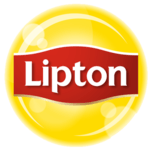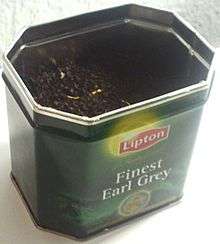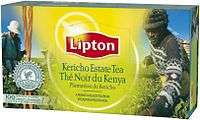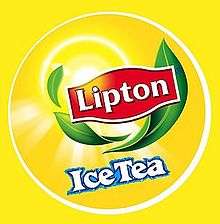Lipton
 | |
| Product type | Tea |
|---|---|
| Owner | Unilever |
| Introduced | 1890 |
| Markets | Worldwide |
| Website | www.liptontea.com |
Lipton is a brand of tea belonging to Unilever and PepsiCo. Lipton was also a supermarket chain in the United Kingdom before it was sold off to Argyll Foods, to allow the company to focus solely on tea. The company is named after its founder Thomas Lipton.
History
- For the personal history of Thomas Lipton, see Thomas Lipton.
Supermarkets
In 1871 Thomas Lipton (1848-1931) of Glasgow, Scotland used his small savings to open his own shop, and by the 1880s the business had grown to more than 200 shops.[1] In 1929 the Lipton grocery retail business was one of the companies that merged with Home and Colonial Stores, Maypole Dairy Company, Vyes & Boroughs,Templetons, Galbraiths & Pearks to form a food group with more than 3,000 stores. The group traded in the high street under various names, but was registered on the UK stock market as Allied Suppliers.[2] Lipton's became a supermarket chain focused on small towns, before Allied's acquisition by Argyll Foods in 1982. The supermarket business was rebranded as Presto during the 1980s.
Tea
Thomas Lipton began travelling the world for new items to stock in this store. One such item was tea, since sales had doubled from £40 million from the late 1870s to £80 million by the mid-1880s. However, he believed the price was far too high, so in 1890 he purchased his own tea gardens in Ceylon, now Sri Lanka, and packaged and sold the first Lipton tea.[3] Staying true to this vision, he arranged packaging and shipping at low costs and sold his tea in packets by the pound (454g), half pound (227g), and quarter pound (113g), with the advertising slogan: "Direct from the tea gardens to the teapot." Lipton teas were an immediate success in the United States.[1]
The Lipton tea business was acquired by consumer goods company Unilever in a number of separate transactions, starting with the purchase of the United States and Canadian Lipton business in 1938 and completed in 1972 when Unilever bought the remainder of the global Lipton business from Allied Suppliers.
In 1991, Unilever created a first joint venture with PepsiCo, the Pepsi Lipton Partnership, for the marketing of ready to drink (bottled and canned) teas in North America. This was followed in 2003 by a second joint venture, Pepsi-Lipton International (PLI), covering many non-United States markets. PLI was expanded in September 2007 to include a number of large European markets. PepsiCo and Unilever each control 50% of the shares of these joint ventures.[4]
Due to the 2008 Chinese milk scandal, food giant Unilever started recalling its Lipton milk tea powder in Hong Kong and Macau on 30 September 2008. The tea powder, which used Chinese milk powder as its raw ingredient, was recalled after the company's internal checks found traces of melamine in the powder.[5][6]
In 2011 PETA criticized Lipton tea manufacturer Unilever for conducting and funding experiments on rabbits, pigs and other animals in an attempt to make human health claims about the tea’s ingredients. According to the animal rights organization, Unilever decided to end the practice for Lipton products after receiving more than 40,000 appeals from PETA supporters and days before PETA made plans to launch its “Lipton CruelTEA” campaign [7] Unilever no longer tests their products on animals unless required to by governments as part of their regulatory requirements. [8]
Soup mixes
Lipton produces instant soup mixes.[9] In the 1950s in the United States, Lipton ran an advertisement campaign promoting French onion dip prepared at home using Lipton's French onion soup mix, thus helping to popularize chips and dip.[10] After this time, many new commercially produced varieties of dips (numbering in the hundreds) were created and produced in the U.S.[10]
Present day

Products target the mass market and are generally positioned in the middle of the price spectrum for tea. Like most branded teas, Lipton teas are a blend selected from many different plantations around the world, from well-known producing countries like, Sri Lanka, India, Kenya, and China. Lipton Yellow Label is blended from as many as 20 different teas.[11]
Apart from black leaf teas (with the long-standing Lipton Yellow Label brand), the company also markets a large range of other varieties, both in leaf tea as well as ready-to-drink format.[12] These include green teas, black flavoured teas, herbal teas, Lipton Linea (a "slimming tea") in Europe and Lipton Milk Tea in various Asian markets. Apart from Lipton Ice Tea, none of their products are available for retail in the UK, as only caterers are supplied.
In a number of markets, including Japan, Russia and Australia, the company is advertising the benefits of theanine, which has psychoactive properties.[13]
Lipton still owns plantations in East Africa ( Kenya (Kericho) and Tanzania (Mufindi) ) In May 2007, Unilever became the first company to commit to sourcing all its tea in a sustainable manner.[14] Working with the Rainforest Alliance, an international environmental NGO, Lipton and its parent company, Unilever, announced all Lipton Yellow Label tea bags sold in Western Europe would be certified by 2010 and all Lipton tea bags sold globally by 2015.[15] Lipton's own tea estates were among the first to be certified.[16][17] Product bearing the Rainforest Alliance seal appeared on Western European markets in 2008 and started appearing in North America in 2009.[18][19]
On 6 May 2009, Lipton received a Corporate Green Globe Award for its work with the Rainforest Alliance.[20]
Brands

Lipton's main pillar brands are Lipton Yellow Label and Lipton Iced Tea. Other product lines exist as well, like the Lipton pyramid (tetrahedron) range in Europe and North America, and Lipton Milk Tea in East Asia. In 2008, the brand launched Lipton Linea in Western Europe.
Lipton Yellow Label
Lipton Yellow Label has been sold since 1890, when Sir Thomas Lipton created the first version of the Yellow pack with a red Lipton shield, which to this day typifies the Lipton Yellow Label brand. It is sold in 150 countries worldwide.[21] Lipton Yellow Label is a blend of several types of tea.
Lipton Yellow Label blend is available both in tea bags, the preferred format in Western Europe, North America and Australia, as well as loose packaged tea, the preferred format in much of the Middle East and throughout Asia. Lipton Yellow Label loose packed tea is rolled into small balls like gunpowder green tea.
Lipton Iced Tea

Lipton Iced Tea, in many markets known as Lipton Ice Tea, is an iced tea brand sold by Lipton.
Lipton Brisk
Brisk, formerly Lipton Brisk, is an iced tea brand distributed primarily in North America as a joint venture between Lipton and PepsiCo. It differs from Lipton's other iced tea brands in that phosphoric acid is added to the blend, giving the beverage a distinctive tart flavor.
Lipton Pyramid Tea
Lipton also produces tea using the tetrahedral bag format as seen in other tea brands.
Lipton Clear was also launched in five variants – Earl Grey Tea, English Breakfast Tea, Peach Mango Tea, Green Tea Mandarin Orange, Mint and Camomile Tea.
Pure Leaf
Pure Leaf is an iced tea brand distributed primarily in North America by the PepsiCo-Lipton joint venture. As opposed to Lipton Iced Tea and Brisk, both of which use a freeze-dried instant tea powder for a base, Pure Leaf is brewed in liquid form.
Lipton worldwide
Available in over 110 countries, Lipton is particularly popular in Europe, North America, Africa and the Middle East, parts of Asia and Australasia (Australia and New Zealand) as well as Latin America and Caribbean. Despite its British origins, Lipton black tea (such as Yellow Label) is not marketed in the UK and is not found in mainstream British stores. However, Lipton Ice Tea and fruit teas are available in the UK.
Marketing and advertising
In 1914 Lipton's tea were one of the sponsors for the first flight from Melbourne to Sydney by French aviator Maurice Guillaux, This was, at the time, the longest air mail and air freight flight in the world. Guillaux wrote, 'I found it the most delicious tea I have ever tasted....I found it very soothing to the nerves.' Lipton printed 250 000 facsimile copies of the letter, and these could be had by sending to Lipton a one-penny stamp. For a threepenny stamp, Lipton would send out a quarter-pound pack of tea.[22]
In an attempt to change the negative perception of Lipton Ice Tea in the United Kingdom – as 60% claimed they do not like the taste before even trying it – Lipton underwent a London-based summer experiential marketing campaign in 2010 under the slogan "Don't knock it 'til you’ve tried it!".[23] Roaming demonstrators handed out 498,968 samples over the 58-day run. After the campaign, 87% of consumers claimed to enjoy Lipton Ice Tea, while 73% said they were more likely to purchase in the future.[24]
Product quality controversy
In November 2011, the General Administration of Quality Supervision, Inspection and Quarantine of China found high levels of toxins in one variety of Lipton tea. Unilever responded by clearing the shelves of all affected products.[25] In April 2012, the non-governmental organization Greenpeace raised questions about Lipton products once again, after two varieties of Lipton tea the group purchased in Beijing supermarkets failed safety tests, with the results allegedly failing to meet regulations as those enforced in the European Union.[26] Additionally, the group stated, "Some of the detected pesticides are also banned for use in tea production by the Chinese Ministry of Agriculture." [26] Unilever China denied the findings, stating all Lipton products within the country were safe.[25]
See also
References
- 1 2 "History of Thomas J. Lipton Company – FundingUniverse". Fundinguniverse.com. Retrieved 2012-10-22.
- ↑ Allied Stores was originally formed in 1929 to act as the group's purchasing arm.
- ↑ "From the tea garden to the tea pot: Sir Thomas Lipton's Vision". Lipton® Tea. Retrieved 29 October 2014.
- ↑ "PepsiCo and Unilever extend partnership". Just-drinks.com. Retrieved 29 October 2014.
- ↑ "Lipton-brand milk tea powder recalled in Asia". Yahoo! News. Associated Press. Archived from the original on 3 October 2008. Retrieved 2008-09-30.
- ↑ "Lipton milk tea powder recalled in Hong Kong". USA Today. Associated Press. 2008-09-30. Retrieved 2008-09-30.
- ↑ Zelman, Joanna (2 February 2011). "Unilever Ends Animal Testing On Lipton Tea Products After PETA Threatens Major Campaign". Huffington Post. Retrieved 10 February 2015.
- ↑ "Developing alternative approaches to animal testing". Unilever global company website. Retrieved 2016-06-08.
- ↑ ": Lipton® Tea". Lipton® Tea. Retrieved 29 October 2014.
- 1 2 "The Oxford Companion to American Food and Drink". Books.google.com. Retrieved 29 October 2014.
- ↑ Archived January 11, 2009, at the Wayback Machine.
- ↑ Fabricant, Florence (2006-09-13). "Brewing for the True Believer; Tea's Got a Brand New Bag". The New York Times. Retrieved 2010-05-07.
- ↑ "LIPTON Tea & Your Health". Archived from the original on 24 September 2010. Retrieved 26 December 2010.
- ↑ "SignOnSanDiego.com > News > Business -- Unilever to sell environmentally sustainable tea". Signonsandiego.com. Retrieved 29 October 2014.
- ↑ "About us". Unilever.com. Retrieved 29 October 2014.
- ↑ "Time to brew up a sustainable cuppa". The Independent. Retrieved 29 October 2014.
- ↑
- ↑ "Sense & Sustainability: Banking on greener tea". Nationalpost.com. Retrieved 29 October 2014.
- ↑ "Rainforest certified Lipton tea reaches U.S.". Uk.reuters.com. Retrieved 29 October 2014.
- ↑ "Leaders in Sustainability Honored at Rainforest Alliance Gala 2009 - Rainforest Alliance". Rainforest-alliance.org. Retrieved 29 October 2014.
- ↑ "Lipton® Tea". Lipton® Tea. Retrieved 29 October 2014.
- ↑ Sydney Morning Herald, Saturday 25 July 1914.
- ↑ "Lipton launch 'Don't Knock it Until You've Tried It' Campaign". Promotional Marketing.
- ↑ "Lipton Experiential Marketing Results". iD Experiential.
- 1 2 Blanchard, Ben (April 24, 2012). "Greenpeace says finds tainted Lipton tea bags in China". Chicago Tribune. Archived from the original on 26 April 2012. Retrieved April 30, 2012.
- 1 2 "Lipton tea laced with toxic pesticide residue". Greenpeace.org. Retrieved 29 October 2014.
External links
| Wikimedia Commons has media related to Lipton (tea). |
- Lipton Tea Global (select your region)
- Lipton Institute of Tea
- Lipton Iced Tea Australia
- Lipton Pyramid Tea Bag Hong Kong
- Lipton Ice Tea Indonesia